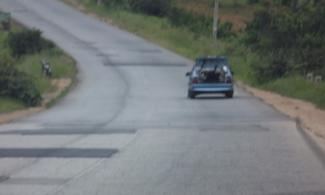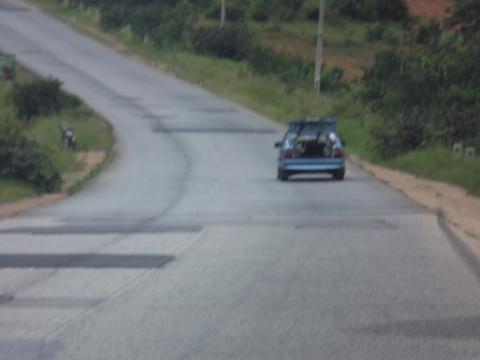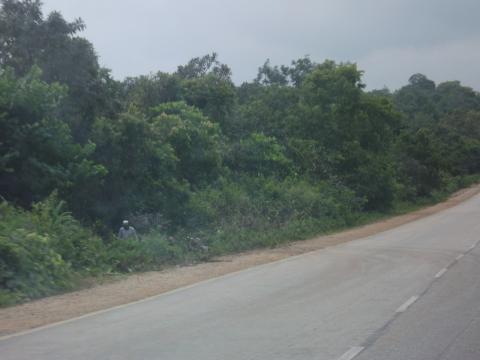
It is really a problem in Nigeria that when terrible things happen, nobody around the scene wants to say anything, possibly, out of fear or suspicion.
We passed through the well laid-out streets and roads in some parts of Abuja. About a minute had gone after the music ended and a pastor on the channel started preaching about the second coming of Jesus Christ.

The driver stopped the pastor’s sermon (Wazobia FM 99.5) and pulled out a tape from a small black polythene bag and pushed it into his radio. It was the music of P-square (Peter and Paul Okoye), the twin brothers and famous rich Nigerian musicians.
The tape played “Chop my money/Chop my money”. After that he played Chukwudi Ken Agale, popularly called ‘Chuddy K.S’, “Gaga crazy…”
“Go gaga going crazy/O yes she’s going crazy/As you dey dance dey go dance dirty/As you dey mine dey go my eyes dirty,” the lyrics said. That song is the ringtone of my cheap Samsung phone. The driver, the lady behind him, and another passenger were singing the songs word for word and dancing.
As we advanced toward the Asokoro area in Abuja about 9.30 a.m., the driver played the Fela Anikulapo Kuti, the African afro-beat king’s “Expensive Shit”:
“Long time ago/African man, we no dey carry shit/we dey shit inside big – big hole/for Yoruba land na Shalanga/for Iboland na onunu – insi/for Hausa land na salga/….” It was only the driver and I who were interested in Fela’s “Expensive Shit”. Others were not.
Ten minutes after, we were at the Abacha Barracks junction.
In December 2010, suspected Boko Haram bombers attacked the crowded “Mammy” market near the barrack. The roads around were dual carriage and well-paved.
On the road, we started seeing cars ahead of us were travelling in same direction, turning, and driving toward us. We were a bit scared and curious. I asked the driver to park and find out what was happening.
Something ran through my mind. It was in Nyanya Motor Park some four months before that Boko Haram bombers attacked and killed several persons. I pulled my head through our car window and asked several persons in other cars that were turning, but all said didn’t know what was happening.
It is really a problem in Nigeria that when terrible things happen, nobody around the scene wants to say anything, possibly, out of fear or suspicion. I had to bark at one driver asking why was he turning and didn’t even know was happening.
He rained abuses on me. “Your grandfather is an imbecile,” he said. I didn’t say anything to him, though I was angry at his unnecessary attack. I walked to a nearby place off the road where I saw about ten commercial motorcycles; commonly called okada, parked. Their riders stood by them, and some mounted the bikes.
I asked them what was happening. They took time to explain to me that a fuel tanker had broken down on our side of the road and that caused the terrible traffic. I returned to the car and narrated to the driver and other passengers. He was a bit unhappy and confused. But I advised him to take through the Bwari – Kaduna axis northward.
Apart from the driver and I nobody came out of the vehicle, and some passengers were praying furiously. I took time to explain to the passengers why we should take through the Bwari-Kaduna Road to Jos.
The driver said travelling from Abuja to Jos through Asokoro-Nyanya-Keffi would take about three hours. Through the Bwari-Kaduna area would take more hours and consume more fuel. I told the driver that I will bear the additional cost of petrol through the Bwari-Kaduna area. I gave him two thousand Naira (about thirteen dollars) to buy the fuel. The driver turned on his car key and started the car; driving toward the Bwari-Kaduna area.
Heaps of dirty copies of The Complete Sports newspaper on the dashboard fell down on the driver’s legs and mine. I packed them and kept them in a black polythene bag closer to the driver’s leg on the floor. The driver thanked me for paying for the petrol and arranging his newspapers in order. In his usual comic way, he announced that he is the goalkeeper of the Chelsea football club of Nigeria. The lady behind the driver smiled. “Sweetheart, thank you, without you the journey would have been too bad,” she said. I responded to her and said, “Thanks.”
She looked at me again and said, “In fact you are God sent. Sha, this is end time.”
“What do you mean by end time?” I asked her. One of the male passengers, who led the Christian prayers in the car when we were taking off from the Jabi Motor Park, clarified, “End time means when the earth and its evil people would be destroyed by God, and God will take his own chosen people to heaven. All these Boko Haram are signs of end time”.
I laughed. I really didn’t want to engage in such argument, but the way the argument was going I had to contribute to it. I explained to them that violence, insecurity, and unrest is born out of our collective and individual greed, lack of love for one another, ignorance, corruption, bad governance, over-population, laziness, and religious bigotry.
In addition, global warming is worsening our problems--flooding, deaths, erosion, hunger, wars and deadly disease spread, and if we don’t change and act fast worse days are coming.
After my explanations, the passengers became quiet. Perhaps my explanation threw them into deep thoughts. The driver later said, “I told you that I am driving a prophet of God (referring to me).” Some passengers laughed. I kept silent.
We later diverted into a nearby Conoil filling station and bought fuel. At the filling station, the new two thousand Naira notes I gave to the driver were exchanged with his old, worn-out Naira notes and given to the fuel station attendant. The young girl--who seemed to know the driver—protested, but the driver made some jokes in Hausa and the girl laughed uncontrollably until we left the filling station. I did not care to find out about the jokes, because my eyes were fixed to the top of huge rocky hills by the road, where heavy white smoke was evaporating.
I have travelled from Enugu in the south-eastern part of Nigeria, through Benue and Nasarawa States (north-central), to the Asokoro, Bwari and Kaduna highway into the Kaduna town and had written about it. So I don’t need to write about this route again. (Read Through Udi Hills to Omatseland-Part 4, by Patrick Naagbanton, Sahara Reporters, New York, USA, 1 November 2013.)
The only thing that has changed on the Bwari-Kaduna road since my last journey is that some parts of the road were undergoing repairs. They were more soldiers and police on the road. The increase of violent attacks by Boko Haram and other groups must have been responsible for that.
We cut off the Jere town on the south-west of Kaduna metropolis and headed eastward on Kagarko Road. Jere is the headquarters of Kagarko LGA in Kaduna State. Kargorko Road, which runs through parts of the L.G.A we travelled through is a single carriage road (no barrier in the middle dividing it).
We had gone about two kilometres when we saw a vehicle parked on the left hand side of the road. On the patrol vehicle was the name, “Operation Yaki–Ikara–Makarfi”. Some policemen and soldiers were standing by it with their AK47 riffles in their hands. Two of them stood on both sides of the road: one a soldier, another a policeman. On our side of the road was the soldier, a tall, dark-complexioned man as funny as our driver.

The driver told me that he was of the Berom ethnic group. His people occupy mainly four local government areas (LGAs) (Jos North, Jos South, Riyom, and Barkin Ladi (B-Ladi), located on the north-western parts of Plateau State.
The security men were stopping vehicles and checking them. His eyes searched through our vehicle before he asked us to go with the aid of his hand, but later stopped us. He looked at the face of the lady beside the driver seat who was nodding her head to the tune of songs from her phone. The soldier danced, holding his riffle with his left hand. We laughed and the driver asked him what music was he dancing to, the soldier said he saw somebody (the lady) dancing and decided to join.
As we moved away, I noticed that the tire by my side was a bit unstable while running on the road. I pleaded with the driver to stop and check since we were still closer to the checkpoint. The driver stopped and the two of us (I and driver) got down, to check the tire of the car. I saw a nail had pierced the tire, and I called the driver to see it. I wanted him to change the tire. He refused and argued that since the tire is a tubeless one, he assured us that it was not a problem and that he will remove it when we get to Jos. We continued the journey without replacing the affected tyre while I endured the discomfort.
We had not moved up to a kilometre before reaching the Gidan community. On both side of the road were farmlands with maize and ginger growing healthily.
I saw stacks of dried woods parked in several places along the road. That side of the road was smooth. The landscape was irregular – some parts low, while some high. Close to a sign by the left hand side of the road a dog ran across the road. The driver swiftly reduced his speed; he nearly would have run over the dog.
“The blood of Jesus, the devil has failed ooooo,” the lady behind the driver shouted, while waving her right hand in the air.
I laughed and said, “That is a village dog and not any devil.”
Looking a bit angry at my response, she said further “My dear, you won’t understand because you are not in the spirit. I know what is happening. I am not insulting you, but I have seen you. You are a carnal man.”
I wanted the lady to speak more, and asked her other questions, but the driver interfered with his rib-tickling relief, “The devil can come in several forms. Some come in aeroplane, some in cars, some as police, some as dog, but if the devil comes in cash I will take it”. Everybody in the car, including the lady laughed noisily.
Along the sloppy road were two under-aged boys, one should be seven and the other ten years old with hoes hanged on their shoulders.
They wore white shirts which had been turned brown, dirtied due to work in their farmlands. While walking along Kagarko road they were picking empty plastic water and soft drink bottles that irresponsible passengers thrown out of their cars to the roadside.
Some six metres from the two boys were three under-aged boys holding dried sticks in their right hand with plastic bottles (which I suspected contained drinking water). They were Fulani boys, leading a large herd of cattle, some bigger in size and taller in height than them. After the cattle, a bus drove past us and on it written “Plateau Riders”.
Our driver shouted some words I don’t understand, and the other driver pulled his left hand from his seat and shook it in the air (a way of acknowledging our driver’s greetings). “He is my professional colleague”, the driver said loudly.
Around 11.00 p.m., travelling eastward, we passed a sign by the road on a metal sign post “Dogon-Kumiu”.
There were green grasses with some short and tall trees in their midst. The soil there had a mixture of clay and loamy type, however, was more of the red clay than the sandy loamy soil.
Five minutes later, we got to Kasa Dere where there was an open field with about five children playing. The driver, who had put off his radio since we encountered the Operation Yaki security officials, started playing a Christian song in Hausa language. The song was talking about how Jesus of Nazareth was going about healing the sick and raising the dead in Jerusalem. No sooner than the driver started playing the song, drops of rain pounding the windscreen of our car.
The driver proclaimed to us “the miracle is coming.”
We were approaching the Katugal village when the rain stopped. Around this area were palm trees like the ones in southern Nigeria. Most of the houses here were built with cement and roofed with corrugated iron sheets.
Some were built with red-earth mould and woods, some plastered with cement, others not, but roofed with corrugated iron sheets. There were signs along the road like “slow down, bumps ahead”. There was a big white rectangular iron tank constructed on four long iron stands, on it written “Energy Commission of Nigeria”.
A Nigerian National Petroleum Corporation (NNPC) fuel tanker raced past us as violent wind from it shook our car. The NNPC tanker had been painted with the phrase “Mazaa Bakin Daga”, meaning “men at the warfront”.
The road took a very sharp bend. It coiled in and out and sailed east ward to Maraba Kubacha Junction like a snake. Along the road was a bus which had crashed into a nearby concrete electric pole. The driver explained that the bus was in high speed coiling along the road path, and later veered off the track and crashed into the pole.
I was told that the car killed one person walking along the road and fatally injured some of its occupants. At Maraba-Kubacha junction, the driver informed us that we need to stop and “pay water rate” (urinate). We all came out and paid our water rate in the nearby grasses by the roadside.
I saw a sign on a small metal board, “Farewell to Kaduna…” I thought we were leaving Kaduna State. The sign was quite confusing to me.
The road ahead was smooth. We spent about seven minutes there and some bought ripe banana and fried groundnut some middle-aged women were hawking.
As we took off, a sky-blue coloured Opel Vectra car drove past us. I bought out my camera to take snapshots of the racing car. The car was filled up with persons-in the front with the driver were two persons, at the back were four passengers and at the open boot were two tall, dark young ladies dressed in skirt and blouse. The driver waved his left hand at them and smiled. The ladies in the car boot also waved their hands and smiled too.
On the small road, another NNPC fuel tanker with same “men at warfront” inscription overtook us and the Opel Vectra car dangerously. Our driver told me that the NNPC tankers just bought the fuel from a fuel depot in Sureja, Niger State in north-central Nigeria. The tankers were going to deposit the fuel at a nearby filling station.
We bade farewell to the Kargarko LGA. The Toro ethnic group occupies most of the LGA.
In addition, however, there are Fulani and Hausa settlements too. There have been bloody clashes between Toro people and their Fulani neighbours. Around October 2011, gunmen in a car opened fire on a market in Katari, killing a policeman and escaping unhurt. Since then, there have been several incidents of attacks and counter attacks. There is a Toro LGA in Bauchi State, and a Toro kingdom located on the western boundary of the Republic of Uganda in East Africa.
Along the road before the Jaba LGA was a military checkpoint. Mountains of bags filled with sand were arranged on another. Armed soldiers were positioned behind it and checked vehicles travelling through.
Our driver said Na kpana (good morning) to one of the soldiers, and the man thanked him in Hausa. We diverted into Jaba Road on the left through a gate built of cement with a sculpture like that of a woman. This area is the Jaba LGA, home of the Jaba people, also called the ‘Ham tribe’. Historians, archaeologists, and writers love to visit Jaba regularly.
The home of one of Africa’s oldest culture and civilization-Nok, suggests that the people were engaged in iron technology in ancient times before Christ was born. The Jaba or Nok area has been relatively peaceful compared with other areas in southern parts of Kaduna inhabited by various minority groups. Jaba people speak Jaba and Hausa language.
To be continued.
Naagbanton lives in Port Harcourt, Rivers State capital, Nigeria.